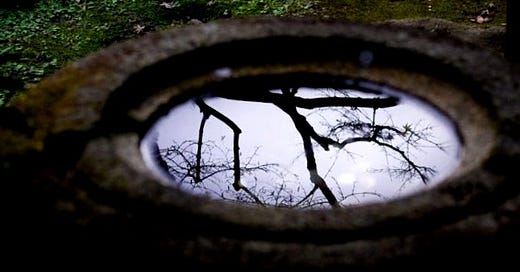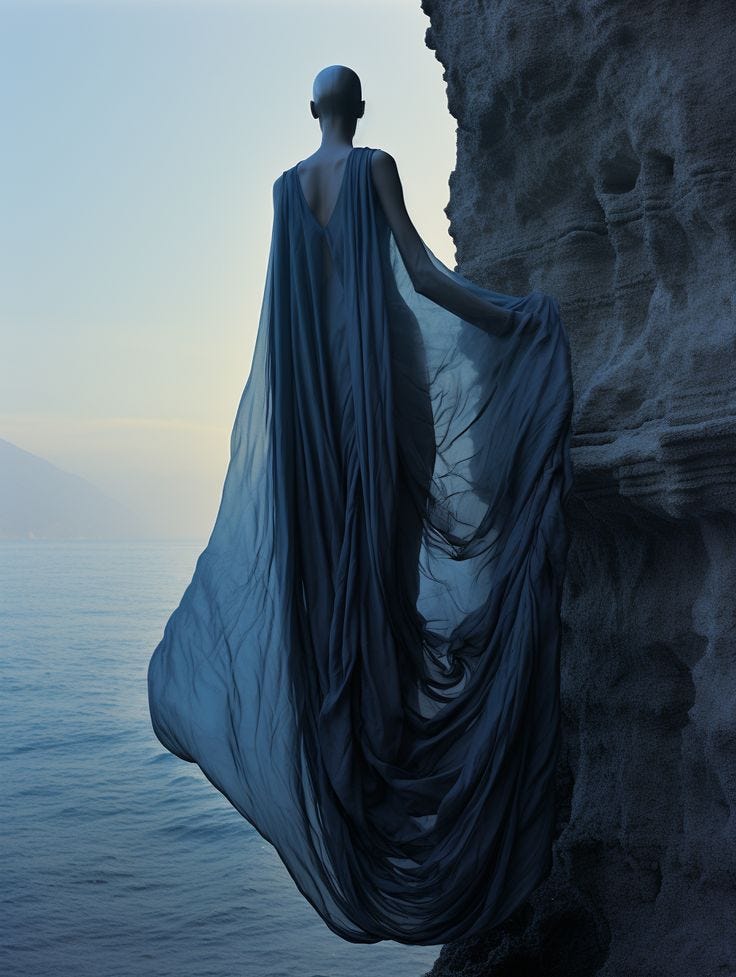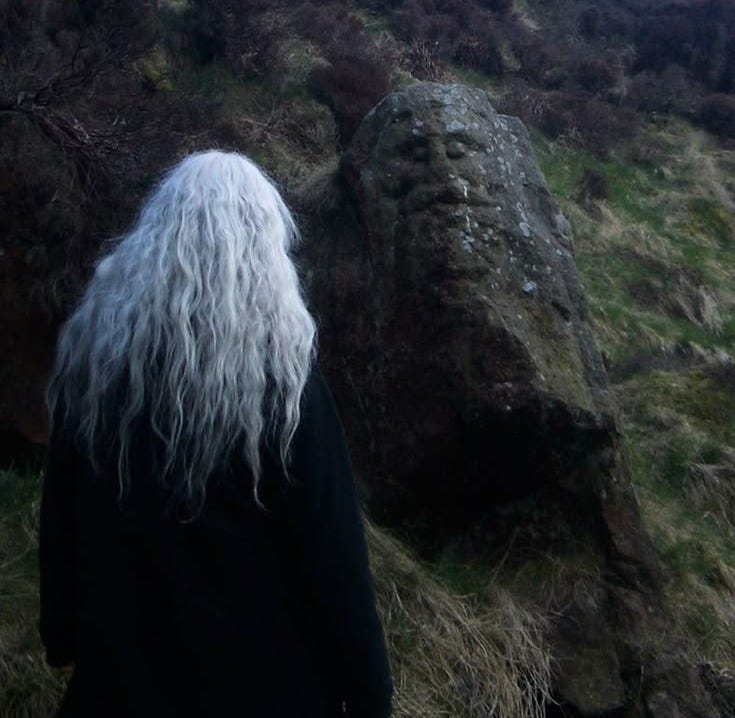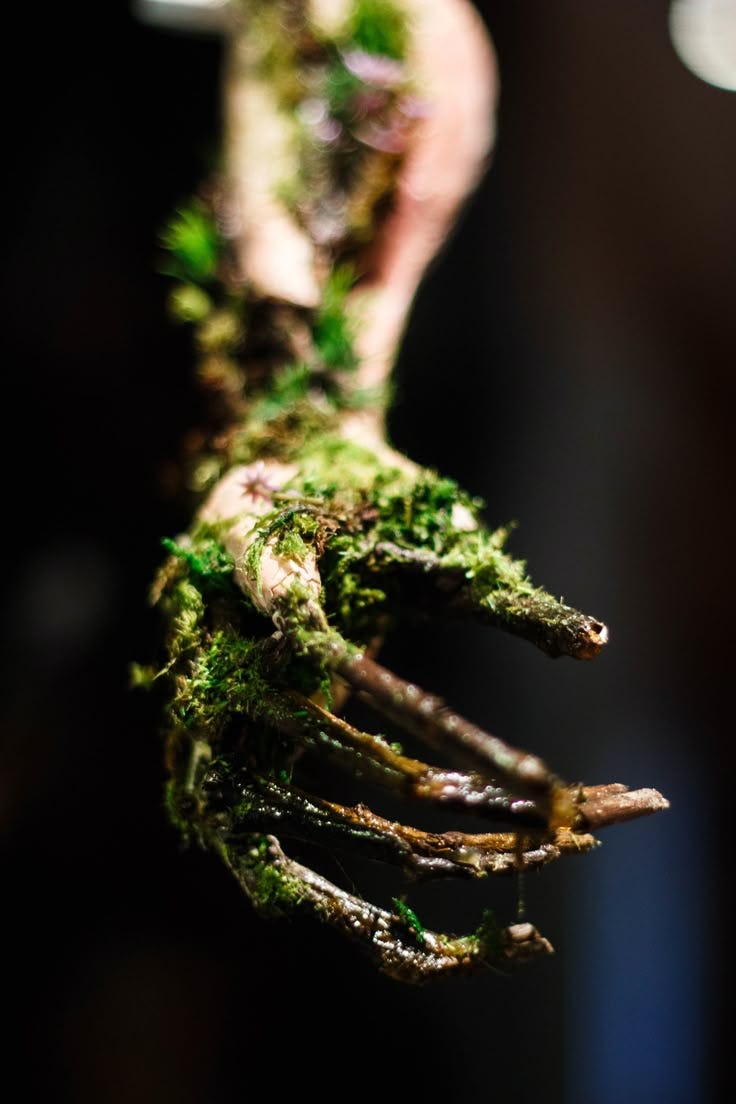Herbs for Every Season of a Woman's Life – Part II.
A spiral path through change: from Queen to Ancestor, from Dark to Beyond, from Bleeding to Becoming. Rooted in the Wise Woman Way. Part II – The Dark Path: the seasons of descent and deep remembering
The Dark Path – Priestess, Crone, Ancestor
The Queen stands at the turning, holding both light and dark in her steady gaze. She is the bridge between what has bloomed and what now begins to fade, the threshold between the bright rising of the first half of the spiral and the deep descent into its shadowed chambers. From her place of sovereignty and golden clarity, the path curves inward.
What was once an outward dance of becoming softens into the dark sweetness of remembering.
This is the Dark Path, the sacred descent into depth. It is not a fall into darkness, but a pilgrimage into the unseen realms.
Here walk The Priestess, The Crone, and The Ancestor – guides into the mysteries that live below the surface of things.
These are the seasons of deep remembering, where the forgotten parts of you begin to stir, where what was cast aside finds its way home.
Here, you learn to listen with your bones, to see with your inner eyes, to trust what cannot be named.
The moon wanes into crescent and dissolves into blackness. The Wheel turns from Mabon’s twilight balance into Samhain’s bone-deep night. The herbs shift from bright green tonics to bitter roots, resinous smokes, dream-opening flowers.
This is not a time to rise and be seen.
It is a time to descend and see.
These seasons are not decay, though many things will die here. They are seasons of seeding, where what falls away becomes the dark, fertile ground for what is yet to come.
They teach that silence is not emptiness, but a fullness that words cannot hold. That darkness is not the absence of light, but the presence of mystery, memory, and the quiet pulse of eternity.
Let us walk now into these dusky chambers. Let us step across the veils to meet the Priestess, who weaves her life from dreams; the Crone, who carries a wisdom older than words; and the Ancestor, whose spirit moves through soil and stone, whispering through the bones of the Earth.
May their stories remind you that descent is not a breaking, but a deepening into who you truly are.
The Priestess
Walker Between Worlds, Keeper of Mystery
She comes wrapped in twilight, speaking in dreams and symbols. The Priestess is the woman who walks with one foot in the unseen, her life a prayer woven into every breath.
She listens to what is hidden beneath words, to the songs carried by water, to the teachings of silence. Her power is not loud, but it shapes everything.
On the Wheel of the Year, she is Mabon, the Autumn Equinox, when light and dark stand in equal measure before the descent begins, inviting reflection, gratitude, and release. Her moon is the Waning Crescent, that sliver of silver sinking into darkness, a time for surrender, rest, and listening beyond what is spoken.
The Priestess is the mystic and guide, the keeper of hidden knowledge. She prays with her hands in the soil, lights candles to call spirit close, gathers herbs beneath the moon for medicine and magic. She lives in the liminal places where the veil thins, where intuition whispers truths too soft for the mind to catch.
In ancient lands, the Priestess held the threads that bound the people to the sacred.
In Egypt, there was Isis, goddess of ten thousand names, healer, magician, mother of Horus, who wove the pieces of her beloved Osiris back into wholeness with her devotion. Her power was her knowing – her capacity to see beyond death into eternal life.
In Celtic lands, the Ban Draoi – women druids – walked the forests, tending sacred groves, keeping the Ogham wisdom of trees, knowing which root called forth vision and which leaf protected from harm. They were not witches in hiding. They were honoured as seers and teachers.
In Slavic folktales, the Vila were priestess-spirits of streams and forests, beautiful and fierce, who danced in moonlit clearings and protected wild places. To cross them without respect brought madness. To honour them brought blessings of insight and song.
Her herbs are visionary, calming, and liminal – supporting dreams, intuition, and the nervous system’s deep quiet.
Tulsi, holy basil, is her breath, opening the heart to devotion, clearing fog from the mind, bringing clarity and a sense of sacred connection with all life.
Blue Lotus, flower of Egyptian rites, softens the edges of thought, inviting dreamtime visions and lucid journeys. It teaches surrender into mystery.
Cedar, the tree of ancestors, brings protection and purification. Its scent grounds the spirit in reverence, reminding the Priestess that she is the living altar.
Mugwort, bitter and silver-backed, opens the gates of dreaming, enhances intuition, and cleanses energies that cling too tightly.
In the moon’s rhythm, the Priestess walks with the Waning Crescent, the time to descend into inner chambers, to seek guidance in stillness, to gather wisdom before the dark moon’s void.
The stories that belong to her are woven with prophecy and devotion.
There is Pythia, Oracle of Delphi, who sat upon her tripod, inhaling sweet laurel smoke, her riddles guiding kings and wanderers alike. She reminds us that the Priestess does not answer with certainty but with mystery, inviting seekers to find their own truth.
And there is Hekate, ancient goddess of the night roads, she who stands at the crossroads with her torches burning, illuminating the unseen paths. She is the Keeper of Keys, opener of gates between worlds, sovereign of shadows and silent places.
Cloaked in dark moonlight, she whispers secrets to those who dare enter her domain. Her power coils like incense in hidden temples, a fragrance both intoxicating and unsettling. For she is the depth that calls to your hidden knowing, the darkness that births true sight, the velvet void where magic flickers like distant stars. She does not promise safety. She promises truth.
The Priestess knows the world may dismiss her knowing as foolishness, her devotion as weakness. But she is not here to prove anything. She is here to be the vessel through which spirit speaks.
If you feel yourself in the Priestess season, ask: where am I being called to listen more deeply? What symbols keep returning in my dreams? What prayer wants to shape my day?
Sit with tulsi tea to open your heart. Burn cedar to clear your space. Anoint your third eye with blue lotus oil. Step barefoot upon the Earth at dusk and whisper:
I am listening. I am the prayer. I am the priestess of my own life.
The Crone
She Who Knows Without Needing to Speak
The Crone is not simply old. She is timeless. She is the scent of rain upon ancient stone, the snow falling silently in a forest, the space between breaths where everything is known without words.
Her presence is felt in the quiet that settles at twilight, in the crow’s call that pierces morning mist, in the long exhale after grief has burned itself clean.
On the Wheel of the Year, she is Samhain, when the veil thins and spirits walk close, when endings are honoured and ancestors remembered.
Her moon is the Dark Moon, the womb of the sky, where nothing is visible yet everything exists, the place of endings and sacred rest before rebirth.
The Crone walks slowly, not because she is weary, but because she no longer rushes. She has sat through many winters, buried many names, and still returns each spring with seeds tucked into her apron pockets.
Her wisdom is the kind that does not arrive through study, but through seasons lived, losses woven into her hair, joys carved into the lines around her eyes.
In the Wise Woman Tradition, the Crone is not cast out. She is not feared, mocked, or pitied.
She is the elder at the fire, the one the children seek when their hearts ache with something they cannot name, the one whose dreams carry medicines for the tribe.
She is the memory-keeper, the dream-tender, the walker between worlds with bare feet and clear eyes.
In Gaelic lore, she is Cailleach, the Veiled One, ancient grandmother of the land, who shapes mountains with her staff and gathers storms within her cloak. She is fierce and unafraid, her blue-black hands sculpting rock and river, her gaze always watching the turning of the worlds.
In Lithuanian myth, Laima sits at the bedside of newborns and the dying, spinning their fates with calm certainty. She does not weep. She sings, her voice weaving acceptance into the fabric of every life.
In Slavic tales, Baba Yaga returns in her crone aspect, living deep in the forest in her chicken-legged hut, bone fences rattling in the wind. She tests those who come, burns away their illusions, and offers her gifts only to those willing to face the truth without trembling.
Her herbs are bone-deep, grounding, warming, often bitter, calling truth to rise to the surface like sap drawn by spring thaw.
Mugwort, known as cronewort in old English herbals, is her dream herb, burned at thresholds, infused into oils, stitched into dream pillows. It sharpens the sight behind the eyes, opens vision between worlds, and brings the courage to see what lies hidden.
Black Cohosh speaks to the body that still carries stories – easing joint aches, soothing hormonal echoes, and holding grief tenderly until it ripens into wisdom.
Reishi, the mushroom of immortality in Taoist tradition, strengthens the Shen, the spirit housed within the heart, teaching the Crone the medicine of slowness, subtlety, and lasting presence.
Valerian root, heavy with dark Earth scent, brings deep rest to weary bones, guiding the Crone into sleep where ancestral voices wait with their quiet counsel.
She walks with the Dark Moon, when the sky is empty of light and everything dissolves into silence. She does not light candles for show. She waits for true fire.
To honour her is to honour death as part of life, to allow space for silence, for unknowing, for the unravelling of who you once were.
To gather your bones around you and say:
I am still here. I have survived. I carry the medicine now.
The Crone is not always an age. Sometimes she is a season. She arrives after loss, after illness, after the leaving of a dream. Sometimes she comes when you are young, placing her hands upon your shoulders to whisper:
Everything unnecessary must fall away. Let it.
If she is with you, let her speak.
Light a small fire. Brew a dark, bitter tea. Lay your head upon the Earth and listen to your dreams. Walk slowly.
For she walks beside you, and the Earth is listening too.
Here, the spiral moves beyond this world, curling into the quiet resting place between lives.
This is the dark, fertile pause where endings become beginnings, where all that you have carried is laid down like offerings upon the soil.
It is the place beyond time, beyond age, beyond name – the most sacred threshold where you are held in the great silence before rebirth
In the old Celtic calendar, there was a day that did not belong to any month – a day outside of time, known as the Day of Mistletoe. It fell on the 23rd of December, after the Winter Solstice marked the death and rebirth of the Sun.
This was the Year and a Day, the space between what has ended and what is yet to begin, the liminal pause where the world holds its breath.
Mistletoe – Allheal – was seen as the most sacred of plants. It grows not from the Earth, but between Earth and sky, rooted in neither, belonging to both. The Druids climbed the oak to harvest it with golden sickles, letting none touch the ground, for it was a gift from the gods. It was the plant of thresholds, protector against poison, healer of wounds, opener of the gates between the living and the dead.
In its white berries glisten the pearls of memory, carrying the whispers of those who came before.
For mistletoe grows in the liminal spaces where magic is strongest, where the worlds intertwine, where life and death touch and recognise each other as kin.
And so, it is here – in this day beyond days, this place beyond places – that we meet The Ancestor.
The Ancestor
Who Walks Beside Us, Rooted in the Bones of Memory
The Ancestor is the breath behind your breath, the warm hand upon your back when no one is in the room. She is the hush in the trees when the wind changes direction, the flicker in the candle just before you speak a name.
She is not gone. She has simply stepped into the soil.
In many traditions, the Ancestor is not a ghost to be feared but a presence to be welcomed. She lives in the bread dough rising quietly on the counter, in the whispered lullabies passed from cradle to cradle, in the scent of dried herbs folded into cloth and hidden in chests of cedar. She is the wisdom that came before words.
In the Celtic worldview, time is a spiral. The dead are not behind us but all around. They walk in the mist and twilight, in the moments when we pause long enough to remember. Samhain is her sacred festival, the dark threshold of the year when the veils thin, but any dusk with drifting smoke can become a doorway if we dare to stand still.
In African cosmologies, ancestors remain part of the family. They are consulted, honoured, and fed. No decision is made without their guidance. They are not separate from daily life but woven into its rhythm like threads of gold through coarse linen.
In Andean tradition, to become an ancestor is not the end of life but the beginning of legacy. It is a return to the mountain, the river, the stone – becoming part of the enduring bones of the Earth.
In Hungarian folktales, the Ősanya, the Old Mother, sits beneath the world tree, weaving the fates of all beings. Birds carry her threads across the skies, their songs reminding us that we are never alone under the dome of stars.
The Ancestor is not only those who have passed.
She is also the future elder you are becoming.
She is the part of you that watches your life with soft eyes, seeing each choice as part of a greater story.
She holds both grief and grace in her weathered palms.
Her herbs are those of remembrance and sacred connection.
Rosemary, long laid upon graves and brewed into tea for ancestral rites, sharpens memory but softens the veil. A bridge herb, a witness, reminding us that remembering is also a form of honouring.
Cedar, sacred to First Nations and Northern forests alike, is burned to clear old pain and call in wisdom. Its smoke rises like a prayer, curling upward into unseen realms, carrying messages where words cannot go.
Yarrow returns again as protector, healer of ancestral lines that run through our veins like rivers. It weaves a shield around grief, allowing sorrow to soften without drowning the heart.
Myrrh, resin of mourning and holy offering, teaches us to sit with old sorrows. Not to fix them, but to tend them gently, holding the stories of our mothers’ mothers with dignity and devotion.
In the moon’s rhythm, the Ancestor aligns not with a single phase, but with the darkness beyond the dark. She is the soil in which new seeds root.
She is the stillness holding all that was and all that will be.
To honour her is to speak the names. To light a candle at dusk and say, I remember. To cook the food your grandmother made, to pour tea at the roots of an old tree, to ask your body what it still carries that was never yours to hold.
You do not need to know their names to call them. You can say:
To the wise ones, the healed ones, the kind and whole ones – I welcome you. Walk with me. Remind me who I am.
And in time, you too will become the whisper.
The warm breeze on a hard day. The knowing in your daughter’s bones. The medicine passed down not in bottles, but in story, in soil, in song.
A Living Thread
There is no single path through womanhood. There is no perfect spiral. Some seasons arrive early, others late. Some loop back, unexpected. Some are lived all at once.
We bleed. We love. We rage. We quiet. We carry. We rest. We return.
These phases are not boxes to be ticked or roles to perform. They are running waters within you. They rise and fall, sometimes gently, sometimes with force. But they are always yours.
And in every season, there are plants standing with open hands, ready to remind you of what you already know. You do not need to do this alone. You never did.
You carry the seeds of the Wise Woman Way in your marrow.
You remember the taste of the old remedies, even if your tongue has forgotten.
You belong to the Earth, and she has never stopped speaking to you.
This writing is for you. For your seasons. For your remembering. For the sacred curve of your becoming.
If these words have been medicine, may they ripple gently outward.
And if you feel called to support this work, to hold the thread with me, I now offer a Buy Me a Tea option.
There are no locked gates here, no subscriptions required. Just a way to nourish what nourishes you.
To those who have already placed tea in my cup, thank you.
You have given me breath. You have given me the freedom to write from the heart, not from pressure.
This is how we keep the circle whole. This is how we walk each other home.
Now go sip something warm.
Go touch a leaf.
Go listen for the ancient voice inside you.
She is still singing…









Again, thank you, Noemi. I just really appreciate all this info and how you organized and presented it. Smiling in love and gratitude, Lynette